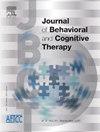A Cross-Cultural Comparison of the Bivalent Fear of Evaluation Model for Social Anxiety
Abstract
Social anxiety is one of the most common mental health problems worldwide; however, the prevalence of social anxiety symptoms differs between collectivistic and individualistic cultures. These differences may have important implications for guiding cognitive-behavioral treatment. The purpose of this study was to determine whether differences in the experience of social anxiety exist across countries with varying cultures, and whether the bivalent fear of evaluation model is valid for both individualistic (Australia and the United States) and collectivistic countries (Korea and Japan). A total of 704 participants (279 from Australia, 137 from the United States, 101 from Korea, and 187 from Japan) completed questionnaires assessing these constructs. Analysis of covariance with age and gender as covariates revealed that symptoms of social anxiety and fear of negative evaluation are reported more in collectivistic countries, while fear of positive evaluation (FPE) is higher in individualistic countries. The results of path analysis and multiple group path analysis indicated that the structure of the bivalent fear of evaluation model differs across cultures. A direct path from FPE to social anxiety was only observed in individualistic countries; however, the relationship between disqualification of positive social outcomes (DPSO) and social anxiety was stronger in collectivistic countries. These findings imply that FPE and DPSO may have different functions of relevance to social anxiety in individualistic and collectivistic countries, and indicate that modifications may be necessary in the application of cognitive-behavioral treatment strategies across cultures.

 求助内容:
求助内容: 应助结果提醒方式:
应助结果提醒方式:


